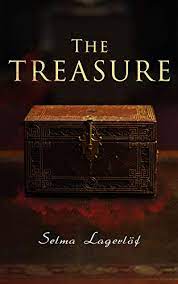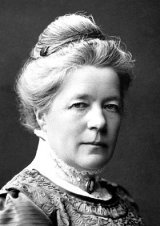The Treasure Page #6
The Treasure is a 1904 novel by the Swedish writer Selma Lagerlof. Its original Swedish title is Herr Arnes penningar, which means "Mr. Arne's money". It has also been published in English as Herr Arne's Hoard. Set in Bohuslän in the 16th century, it tells the story of a group of Scottish mercenaries who escape from prison; they go on to murder a family to steal a treasure chest, after which one of them falls in love with the family's sole survivor.
All this had such a real and natural air that Torarin began to feel more and more courageous. He walked quite boldly across the room to Herr Arne, asking himself whether the murder was not an evil dream and whether Herr Arne was not in truth alive. But as Torarin crossed the room, his eyes from old habit sought the four-post bed, beside which the great money chest used to stand. But the ironbound chest was no longer in its place, and when Torarin saw that a shudder again passed through him. "Now Torarin is to tell us how things went at the assize today," said Herr Arne. Torarin tried to do as he was bid and tell of the assize and the inquest, but he could command neither his lips nor his tongue, and his speech was faulty and stammering, so that Herr Arne stopped him at once. "Tell me only the main thing, Torarin. Were our murderers found and punished?" "No, Herr Arne," Torarin had the boldness to answer. "Your murderers lie at the bottom of Hakefjord. How would you have any take revenge on them?" When Torarin returned this answer Herr Arne's old temper seemed to be kindled within him and he smote the table hard. "What is that you say, Torarin? Has the Governor of Bohus been here with judges and clerks and held assize and has no man had the wit to tell him where he may find my murderers?" "No, Herr Arne," answered Torarin. "None among the living can tell him that." Herr Arne sat awhile with a frown on his brow, staring dismally before him. Then he turned once more to Torarin. "I know that you bear me affection, Torarin. Can you tell me how I may be revenged upon my murderers?" "I can well understand, Herr Arne," said Torarin, "that you wish to be revenged upon those who so cruelly have deprived you of your life. But there is none amongst us who walk God's earth that can help you in this." Herr Arne fell into a deep brooding when he heard this answer. There was a long silence. After a while Torarin ventured to put forward a request. "I have now fulfilled your desire, Herr Arne, and told you how it went at the assize. Have you aught else to ask me, or will you now let me go?" "You are not to go, Torarin," said Herr Arne, "until you have answered me once more whether none of the living can give us vengeance." "Not if all the men in Bohuslen and Norway came together to be revenged upon your murderers would they be able to find them," said Torarin. Then said Herr Arne: "If the living cannot help us, we must help ourselves." With this Herr Arne began in a loud voice to say a paternoster, not in Norse but in Latin, as had been the use of the country before his time. And as he uttered each word of the prayer he pointed with his finger at one of those who sat with him at the table. He went through them all in this way many times, until he came to Amen. And as he spoke this word his finger pointed at the young maid who was his niece. The young maid rose at once from the bench, and Herr Arne said to her: "You know what you have to do." Then the young maiden lamented and said: "Do not send me upon this errand! It is too heavy a charge to lay upon so tender a maid as I." "You shall assuredly go," said Herr Arne. "It is right that you go, since you have most to revenge. None of us has been robbed of so many years of life as you, who are the youngest among us." "I desire not to be revenged on any man," said the maiden. "You are to go at once," said Herr Arne. "And you will not be alone. You know that there are two among the living who sat with us here at table a week ago." But when Torarin heard these words he thought they meant that Herr Arne charged him to contend with malefactors and murderers, and he cried out: "By the mercy of God I conjure you, Herr Arne--" At that moment it seemed to Torarin that both Herr Arne and the parsonage vanished in a mist, and he himself sank down as though he had fallen from a giddy height, and with that he lost consciousness. When he came to himself again dawn was breaking and he saw that he was lying on the ground in the yard of Solberga parsonage. His horse stood beside him with the sledge, and Grim barked and howled over him. "It was all but a dream," said Torarin; "now I see that. The house is deserted and in ruin. I have seen neither Herr Arne nor any other. But I was so startled by the dream that I fell off the load." CHAPTER IV IN THE MOONLIGHT When Herr Arne had been dead a fortnight there came some nights of clear, bright moonlight, and one evening Torarin was out with his sledge. He checked his horse time after time, as though he had difficulty in finding the way. Yet he was not driving through any trackless forest, but upon what looked like a wide and open plain, above which rose a number of rocky knolls. The whole tract was covered with glittering white snow. It had fallen in calm weather and lay evenly, not in drifts and eddies. As far as the eye could see there was nothing but the same even plain and the same rocky knolls. "Grim, my dog," said Torarin, "if we saw this tonight for the first time we should think we were driving over a great heath. But still we should wonder that the ground was so even and the road free from stones and ruts. What sort of tract can this be, we should say, where there are neither ditches nor fences, and how comes it that no grass or bushes stick up through the snow? And why do we see no rivers and streams, which elsewhere are wont to draw their black furrows through the white fields even in the hardest frost?" Torarin was delighted with these fancies, and Grim too found pleasure in them. He did not move from his place on the load, but lay still and blinked. But just as Torarin had finished speaking he drove past a lofty pole to which a broom was fastened. "If we were strangers here, Grim, my dog," said Torarin, "we might well ask ourselves what sort of heath this was, where they set up such marks as we use at sea. 'This can never be the sea itself?' we should say at last. But we should think it utterly impossible. This that lies so firm and fast, can this be only water? And all the rocky knolls that we see so firmly united, can they be only holms and skerries parted by the rolling waves? No, we should never believe it was possible, Grim, my dog." Torarin laughed and Grim still lay quiet and did not stir. Torarin drove on, until he rounded a high knoll. Then he gave a cry as though he had seen something strange. He put on an air of great surprise, dropped the reins and clapped his hands. "Grim, my dog, so you would not believe this was the sea! Now you can tell what it is. Stand up, and then you will see that there is a big ship lying before us! You would not recognize the beacons, but this you cannot mistake. Now I think you will not deny that this is the sea itself we are driving over." Torarin stayed still awhile longer as he gazed at a great vessel which lay frozen in. She looked altogether out of place as she lay with the smooth and even snowfields all about her.
Translation
Translate and read this book in other languages:
Select another language:
- - Select -
- 简体中文 (Chinese - Simplified)
- 繁體中文 (Chinese - Traditional)
- Español (Spanish)
- Esperanto (Esperanto)
- 日本語 (Japanese)
- Português (Portuguese)
- Deutsch (German)
- العربية (Arabic)
- Français (French)
- Русский (Russian)
- ಕನ್ನಡ (Kannada)
- 한국어 (Korean)
- עברית (Hebrew)
- Gaeilge (Irish)
- Українська (Ukrainian)
- اردو (Urdu)
- Magyar (Hungarian)
- मानक हिन्दी (Hindi)
- Indonesia (Indonesian)
- Italiano (Italian)
- தமிழ் (Tamil)
- Türkçe (Turkish)
- తెలుగు (Telugu)
- ภาษาไทย (Thai)
- Tiếng Việt (Vietnamese)
- Čeština (Czech)
- Polski (Polish)
- Bahasa Indonesia (Indonesian)
- Românește (Romanian)
- Nederlands (Dutch)
- Ελληνικά (Greek)
- Latinum (Latin)
- Svenska (Swedish)
- Dansk (Danish)
- Suomi (Finnish)
- فارسی (Persian)
- ייִדיש (Yiddish)
- հայերեն (Armenian)
- Norsk (Norwegian)
- English (English)
Citation
Use the citation below to add this book to your bibliography:
Style:MLAChicagoAPA
"The Treasure Books." Literature.com. STANDS4 LLC, 2025. Web. 10 Mar. 2025. <https://www.literature.com/book/the_treasure_6>.








Discuss this The Treasure book with the community:
Report Comment
We're doing our best to make sure our content is useful, accurate and safe.
If by any chance you spot an inappropriate comment while navigating through our website please use this form to let us know, and we'll take care of it shortly.
Attachment
You need to be logged in to favorite.
Log In